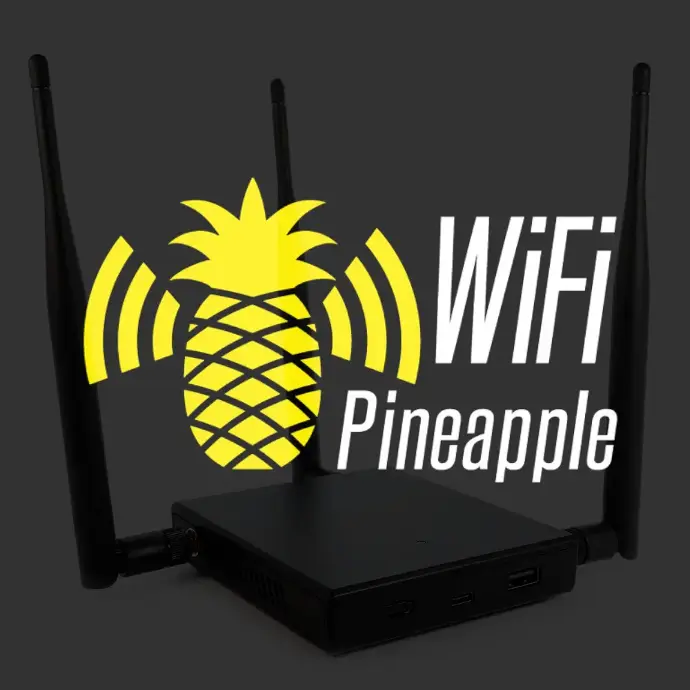We realize that very few in the general population know what a, what's it? Wi...Fi....PineAPPLE??! We still aren't entirely sure what this thing is, but we do know what it's capable. And, oh man, it's cool... and scary.
Let's ask our Uni-Vac to translate what this is for the masses and for the DIY network administrators to know what they are up against.
What is the Wi-Fi Pineapple?
The Wi-Fi Pineapple is a small, portable device equipped with multiple Wi-Fi radios and antennas. It runs a modified version of Linux, allowing users to deploy and execute various attacks on wireless networks. The device is relatively affordable and user-friendly, making it popular among both professionals and hobbyists.
How Does the Wi-Fi Pineapple Exploit Networks?
- Rogue Access Point (AP) Attack:
- How it works: The Wi-Fi Pineapple can be configured to mimic legitimate wireless networks by creating rogue access points. When users' devices automatically connect to these fake APs (because they recognize the SSID as familiar), the attacker can intercept and monitor their traffic.
- Impact: This allows attackers to perform Man-in-the-Middle (MitM) attacks, capturing sensitive information like login credentials, emails, and personal data.
- Evil Twin Attack:
- How it works: This is a specific type of rogue AP attack where the Wi-Fi Pineapple creates an access point with the same name (SSID) as a legitimate one. Users unknowingly connect to the fake AP, believing it's legitimate.
- Impact: Attackers can intercept and alter traffic, redirect users to malicious websites, or harvest credentials.
- Wi-Fi Deauthentication Attack:
- How it works: The Wi-Fi Pineapple can send deauthentication packets to devices connected to a legitimate Wi-Fi network, forcing them to disconnect. The devices then automatically reconnect, often to the rogue AP set up by the attacker.
- Impact: This disrupts the user’s connection and potentially forces them onto a malicious network.
- SSL Strip Attack:
- How it works: By downgrading secure HTTPS connections to insecure HTTP, the Wi-Fi Pineapple can intercept and read data that would otherwise be encrypted.
- Impact: Sensitive data, such as passwords and credit card numbers, can be stolen as they are transmitted in plaintext.
- Probe Request Interception:
- How it works: Devices often send out probe requests to find previously connected Wi-Fi networks. The Wi-Fi Pineapple can intercept these requests and respond as though it is the requested network.
- Impact: Devices then connect to the Pineapple, and all traffic can be monitored or manipulated.
Beware of these devices
or anything with antennae.

Function over form?
How to Protect Against Wi-Fi Pineapple Exploits
- Use a Virtual Private Network (VPN):
- A VPN encrypts all internet traffic, making it difficult for an attacker to intercept or read the data, even if you connect to a rogue AP.
- Disable Automatic Wi-Fi Connection:
- Prevent your device from automatically connecting to known networks. This reduces the risk of connecting to a rogue AP that mimics a legitimate network.
- Be Cautious of Free or Public Wi-Fi:
- Public Wi-Fi networks are prime targets for rogue AP attacks. Avoid accessing sensitive information, such as banking or email, over these networks without a VPN.
- Use HTTPS Everywhere:
- Install browser extensions like HTTPS Everywhere, which forces your browser to use HTTPS connections whenever possible, preventing SSL strip attacks.
- Monitor Wi-Fi Connections:
- Use tools to monitor your Wi-Fi connections and identify suspicious activity, such as unexpected disconnections or unfamiliar SSIDs.
- Keep Devices Updated:
- Regularly update your devices’ operating systems and security software to protect against known vulnerabilities.
- Use Strong Wi-Fi Security:
- Ensure your home or business Wi-Fi network is secured with WPA3 encryption, and avoid using outdated protocols like WEP or WPA.
- Educate Users:
- Awareness and education are critical. Ensure users understand the risks of public Wi-Fi and the importance of verifying the network before connecting.
The Wi-Fi Pineapple is a powerful tool for both security professionals and attackers. Understanding how it works and taking steps to protect against its exploits is essential in maintaining the security of your wireless networks.
Thanks Uni-Vac.
Now before we get our pitchforks out against Hak5, the producers of this device, let's be clear. These programs can be run on any laptop or device with a wireless network adapter that supports monitor mode and packet injection.
Stay safe, stay secure, my friends.